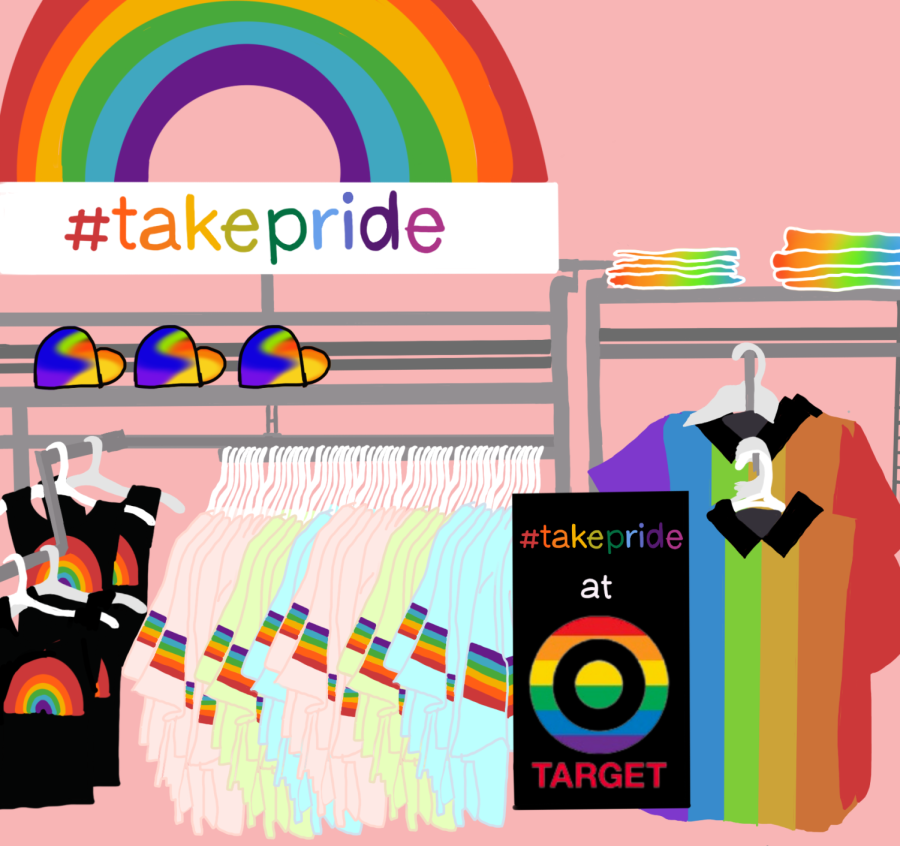The sales of sexuality
March 8, 2022
Usually, a stroll through Target serves as a cathartic experience — an escape from the daily stressors of life. That is what retail therapy should be, right? A boost of serotonin disguised as a few hours of searching for that shirt you’ve had your eye on or that expensive pair of shoes. But all of that happiness comes to a screeching halt when you make uncomfortable eye contact with the physical embodiment of rainbow capitalism: a mannequin dressed in a tacky rainbow tuxedo, serving as a money-maker for big corporations because — that’s right — pride sells. It leaves one to ponder the meaning of it all: is it something worth celebrating, or should we be upset about giant corporations profiting off of the use of symbols that are sacred in the LGBTQ+ community?
Walking the fine line between actual allyship and marketing schemes are corporations that use performative activism to attract consumers. As a bisexual woman, I often find myself stuck in the middle of the situation; on one hand, I am ecstatic about the public acceptance of a part of my identity that I used to hide for fear of ridicule. On the other hand, I cannot help but question the motives of companies like Amazon and McDonald’s, both of whom donated thousands of dollars to politicians who voted against the Equality Act, a bill that “prohibits discrimination based on sex, sexual orientation, and gender identity in areas including public accommodations and facilities, education, federal funding, employment, housing, credit, and the jury system,” as stated by the Congressional Research Service.
In an article by WIRED, Emma Ellis commented on the problem.
“Corporations could be powerful allies using their privilege and deep pockets to put people who do real work for the LGBTQ+ community front and center. Co-opting a color scheme and a few hashtags is … not that,” Ellis said.
It is imperative that we take the time to acknowledge the rich history of the LGBTQ+ Rights Movement, taking into account the milestones and the people who bravely walked so that we could run; milestones like the three-day event known as the Stonewall riots, in which queer youth fought back against blatant discrimination from police officers who constantly attempted to raid a popular gay bar in Greenwich Village. With this event only scratching the surface of its history, there is so much more to pride than just the idea of yet another line of cringe-worthy merchandise.
“Pithy phrases and campy glitz may be great for selling things, but that’s not what this language was made for. Facing alienation from a culture at large, marginalized communities create their own cultures as a form of protection. Queer aesthetics, even the humorous, glamorous, fascinating parts, are often shaped around a basic instinct of survival,” AJ Willingham of CNN wrote.
“Attempts to cash in on these creations are especially jarring in a reality where LGBTQ people still experience discrimination, where their human rights are constantly at risk of being legislated away, and bills targeting transgender individuals pile up in state government,” Willingham said.
This is not to say that I am choosing not to recognize the progressive path that corporations have chosen to follow. I am grateful about the spread of pride merchandise — even if it is atrociously designed sometimes — because it normalizes the presence of individuals who identify as LGBTQ+. In fact, it celebrates our existence, and knowing that this is what people like me used to dream of feels like a win in all capacities.
The next step for the corporations that sell pride merchandise is to get involved. They can openly support the movement by donating to organizations and government officials who want to protect the LGBTQ+ community. Ensuring consumers — the people who keep their corporations from going bankrupt — that they recognize the roots of those they profit from is a meaningful start.












